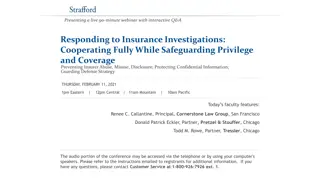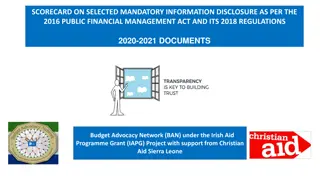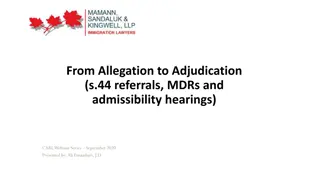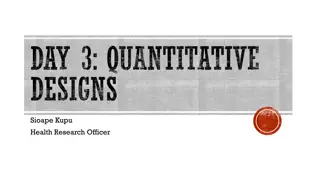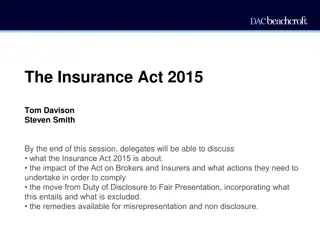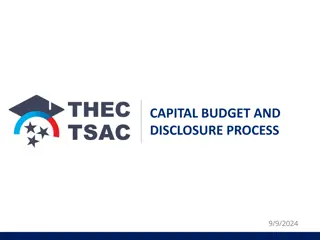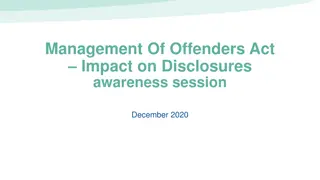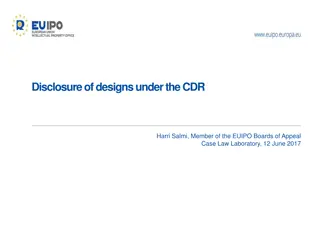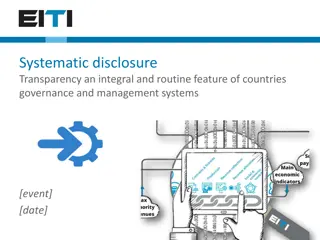Understanding Financial Disclosure and Lifestyle Audits Frameworks
The financial disclosure framework was introduced in 2016 by the Minister for the Public Service and Administration to manage conflict of interest situations in the public service. Designated employees disclose their financial interests annually via the eDisclosure system, and these disclosures are
1 views • 11 slides
Public Interest Disclosure and Protection of Informers Resolution 2004 (PIDPI) Guidelines
Public Interest Disclosure and Protection of Informers Resolution (PIDPI) provides a mechanism for individuals to blow the whistle on corruption and seek protection. Complaints must be sent via post to the Central Vigilance Commission and should not reveal the complainant's identity. Specific guidel
0 views • 6 slides
Understanding Quantitative Research Designs in Health Research
Quantitative research designs play a crucial role in health research, offering various methodologies like experimental and observational designs. Observational designs are commonly used and can establish associations but not causality. Longitudinal designs track outcomes over time, providing valuabl
3 views • 25 slides
Best Home alterations in North Shore
If you\u2019re looking for Home alterations in North Shore, contact Malloch Architecture Ltd. They offer a wide range of services from custom home designs and home alterations to architectural designs and building designs. Their success is attributed to a personal approach to every client. They will
0 views • 6 slides
Insurance Investigations: Handling Privilege, Coverage, and Disclosure
Explore the nuances of responding to insurance investigations in this 90-minute interactive webinar. Learn how to cooperate effectively while protecting privilege, coverage, and confidential information. Gain valuable insights on preventing insurer abuse, misuse, and disclosure, as well as safeguard
0 views • 52 slides
Understanding Conflict of Interest in ACCME Accredited Activities
Conflict of Interest (COI) refers to financial relationships that may create biases in Continuing Medical Education (CME) activities when individuals have ties to commercial interests and can influence the content. ACCME requires disclosure to prevent potential bias in CME content. Non-disclosure ca
0 views • 18 slides
Real Estate Fire Disclosures and Defensible Space Updates
Updates on fire hardening, defensible space disclosure, and addendum requirements in real estate transactions. Includes revisions to disclosure questions, defensible space decision tree, and wildfire disaster advisory. Resources for maximizing member legal services are also highlighted.
0 views • 7 slides
Federal Agencies Guidance on Ethics, Compliance, and Audit Services under NSPM-33
The White House OSTP released guidance for federal agencies to implement NSPM-33 focusing on disclosure requirements, digital identifiers, consequences for violations, information sharing, and research security programs. The guidance emphasizes supporting open scientific inquiry and nondiscriminator
0 views • 10 slides
Understanding Factorial Designs in Experiments
Factorial designs in experiments allow researchers to study the effects of multiple independent variables simultaneously. This type of design enables the examination of main effects and interactions between factors, providing a comprehensive understanding of the research variables. Main effects refe
1 views • 25 slides
Understanding DBS (Disclosure & Barring Service): Purpose, Process, and Categories
The Disclosure and Barring Service (DBS) is a critical aspect of ensuring safe recruitment decisions, particularly for roles involving children and vulnerable adults. This service helps organizations across sectors in England and Wales identify unsuitable candidates by providing access to criminal r
0 views • 14 slides
Scorecard on Mandatory Information Disclosure under 2016 Public Financial Management Act
The Scorecard on Mandatory Information Disclosure analyzes compliance with the 2016 Public Financial Management Act in Sierra Leone. The report shows that 23% of required documents are not produced, 24% of produced documents are not published, and highlights key findings to improve transparency and
0 views • 15 slides
Understanding Explanatory Cross-Sectional Designs in Research
Explore the world of cross-sectional designs in research, focusing on the explanatory type that delves into relationships among variables within populations. Learn about the distinctive features, types of designs, and research objectives associated with this methodology.
2 views • 23 slides
Section 44 Process in Immigration Adjudication
The process from allegation to adjudication in immigration cases involves Section 44 referrals, MDRs, and admissibility hearings under IRPA. Officers have discretion to write reports or issue removal orders based on inadmissibility opinions. Procedural fairness is essential, including providing deta
0 views • 19 slides
Understanding Nonexperimental and Quasi-experimental Studies
Nonexperimental and quasi-experimental studies resemble experiments but lack random assignment, making them valuable for group comparisons without establishing causation. This type of research design looks at differences between groups that already exist, focusing on group differences rather than ca
1 views • 35 slides
Understanding Experimental Psychology: Designs and Control Issues in Research
This content delves into the basics of experimental research, focusing on different types of experimental designs and control issues. It covers between-group and within-group designs, discussing advantages and disadvantages, as well as methods for controlling for nonequivalence. The importance of ra
0 views • 26 slides
Understanding Clinical Trials: Types and Designs
Clinical trials are essential research studies that evaluate new tests and treatments to improve human health outcomes. They involve various phases, designs, and purposes, such as treatment trials, prevention trials, and observational studies. Different types of clinical trial designs include experi
7 views • 18 slides
Understanding Quantitative Designs in Health Research
Explore different types of quantitative research designs including observational, longitudinal, and case-control studies. Learn how these designs are used to establish associations, measure outcomes over time, and compare groups. Discover the advantages and disadvantages of longitudinal designs in c
0 views • 25 slides
Understanding the Impact of the Insurance Act 2015 on Brokers and Insurers
The Insurance Act 2015 brings significant changes in insurance contract law, shifting from Duty of Disclosure to Fair Presentation. This Act influences both Brokers and Insurers, requiring clear and accessible disclosure of material circumstances. The remedies for misrepresentation and non-disclosur
0 views • 19 slides
Updated Disclosure Rules for Financial Relationships in Continuing Education
ACCME updated its Standards for Integrity and Independence in Continuing Education, requiring disclosure of financial relationships with specific "ineligible companies" by all involved parties. The rules aim to enhance transparency and mitigate conflicts of interest in accredited continuing educatio
1 views • 5 slides
Understanding Disability Disclosure in Employment: Practical and Ethical Considerations
This presentation touches on the practical and ethical issues supported employment professionals face when dealing with disability disclosure. The agenda includes ADA provisions, successful disclosure strategies, the professional's role in the process, and available resources. The session covers dis
0 views • 33 slides
Understanding Disclosure of Adverse Clinical Events in Healthcare
Exploring the essential elements of disclosing adverse clinical events to patients and families in healthcare settings. It covers why disclosure is crucial, barriers to disclosure, triggers for disclosure, policies and procedures, and the other important aspects related to the disclosure process.
0 views • 8 slides
Understanding the Capital Budgeting and Disclosure Process
This content provides a comprehensive overview of the capital budgeting and disclosure process, focusing on fiscal years, budget terms, and the sequential steps involved in the capital budget process. It explains the timeline from the Governor's capital budget release to the final approval by the go
2 views • 23 slides
Example of COI Disclosure Formats in Academic Presentations
These images provide examples of Conflict of Interest (COI) disclosure formats for oral and poster presentations in academic settings. They outline how authors can disclose any potential COIs in relation to their work over the past three years, including details on employment, stock ownership, paten
1 views • 4 slides
Detailed Guidance and Requirements for Implementing NSPM-33
The update provides detailed guidance on implementing NSPM-33's disclosure requirements and other provisions discussed in the January 2022 CLASP Meeting. It includes areas such as disclosure requirements, digital persistent identifiers, consequences for violations, information sharing, and research
1 views • 19 slides
Healthy Breakfast in a Jar Designs for On-the-Go Nutrition
In this project, students are tasked with designing and creating four different Breakfast in a Jar options that promote healthy eating. They need to consider ingredients that provide energy, protein, fiber, vitamins, and minerals. The designs should be colorful, incorporate a variety of textures, an
0 views • 11 slides
Exciting School Spirit Shirts Now Available for Online Orders!
Unleash your school spirit with a range of creatively designed spirit shirts available for online purchase. Each shirt has its own unique link for easy ordering. Simply follow the link provided to explore and order your favorite designs. Visit Poinciana High School's online store to discover more op
0 views • 8 slides
Understanding Modern Non-inferiority Trial Designs in Antibiotic Development
This article discusses the significance of non-inferiority designs in advancing antibiotic development to combat multidrug-resistant bacteria. It emphasizes the importance of distinguishing between UDR, MDR, and XDR bacterial categories in trial design, highlighting challenges in selecting comparato
0 views • 12 slides
Transparency in Banking: Examining Disclosure and Regulation
Discussion on the importance of transparency in the banking industry, focusing on the level of information disclosure by banks and its impact on market discipline, lending practices, and regulatory intervention. Papers explore different facets of transparency, including the disclosure audience, natu
0 views • 10 slides
Understanding Quantitative Research Designs in Nursing
Delve into the world of quantitative research in nursing, exploring different research designs and the concept of causality. Learn about experimental, quasi-experimental, and non-experimental designs, as well as the characteristics of experimental design like manipulation, control, and randomization
0 views • 22 slides
Evolution of Vulnerability Disclosure Practices
The history of vulnerability disclosure, from the early days of mailing lists and zines to the emergence of Full Disclosure and the debates around anti-disclosure groups. The timeline covers key events like the Morris worm, Code Red, the founding of Bugcrowd, and more, illustrating the evolution of
0 views • 11 slides
Impact of Management of Offenders Act on Disclosure Awareness Session
On 30 November 2020, new legislation including the Age of Criminal Responsibility (Scotland) Act 2019 and the Management of Offenders (Scotland) Act 2019 came into force, transforming the disclosure system in Scotland. These changes raise the age of criminal responsibility, reduce rehabilitation per
0 views • 10 slides
Understanding Disclosure of Designs under CDR - Key Insights
The article explores the disclosure of designs under the Community Design Regulation (CDR) and Community Design Invalidity Regulation (CDIR). It discusses the criteria for public availability, evidence required for proving prior disclosure, and the basic rules for establishing the disclosure of a pr
0 views • 9 slides
Gamifying Vulnerability Reporting for Coordinated Disclosure at Microsoft Security Response Center
Christa Anderson, a Senior Security Program Manager at Microsoft's Security Response Center, discusses the importance of gamifying vulnerability report data to encourage coordinated disclosure. The MSRC Top 100, announced at Black Hat USA, plays a crucial role in the public credit strategy by recogn
0 views • 13 slides
Understanding Special Topics in Design: Factorial Experiments and Fractional Designs
This content delves into the world of factorial designs used in design experiments to identify important factors and interactions. It explores 2k full factorial designs and their application in screening potential factors. Additionally, the content discusses 2k-p fractional factorial designs and the
0 views • 19 slides
Governance Mechanisms and Financial Risks Disclosure in Developing Economies
Examining the impact of governance mechanisms on financial risk disclosure in developing economies, this study delves into theories, literature reviews, findings, policy implications, and conclusions. The research emphasizes the importance of adequate risk disclosure for investor trust and regulator
0 views • 9 slides
Understanding Cultural Influence on Delayed Child Sexual Abuse Disclosure in the Vhavena Tribe
Exploring the intersection of culture, tradition, and delayed disclosure of child sexual abuse within the Vhavena Tribe. The study delves into the complexities of disclosure, the unique context of CSA in cultural norms, and behaviors, guided by the Afrocentric theory. Methodology involves interviews
0 views • 15 slides
Enhancing Governance through Systematic Disclosure and Transparency
Systematic disclosure and transparency play a crucial role in the governance and management systems of countries. This involves routine disclosure of information, such as financial data, to promote accountability and address gaps in information. The EITI Standard emphasizes the importance of mainstr
0 views • 23 slides
Conflict of Interest Disclosure for EAPC 2024 Congress
This disclosure statement outlines the conflict of interest policy for speakers at the EAPC 2024 Congress. Speakers are required to disclose any affiliations or financial interests that may potentially influence their presentations. The purpose of the disclosure is to inform attendees so they can ev
0 views • 4 slides
Understanding Experimental Studies in Epidemiology
Epidemiological studies and experimental studies play vital roles in understanding cause-and-effect relationships in research. Experimental studies involve manipulating independent variables and measuring dependent variables, with categories such as true experimental, quasi-experimental, and pre-exp
0 views • 22 slides
Understanding Paired-Samples Designs in Research
Paired-samples designs are valuable in research when the assumption of independence is violated, leading to dependency across groups. These designs involve comparing means of two related groups with smaller variance in the dependent variable. Repeated-measures designs offer a framework for successiv
0 views • 20 slides




